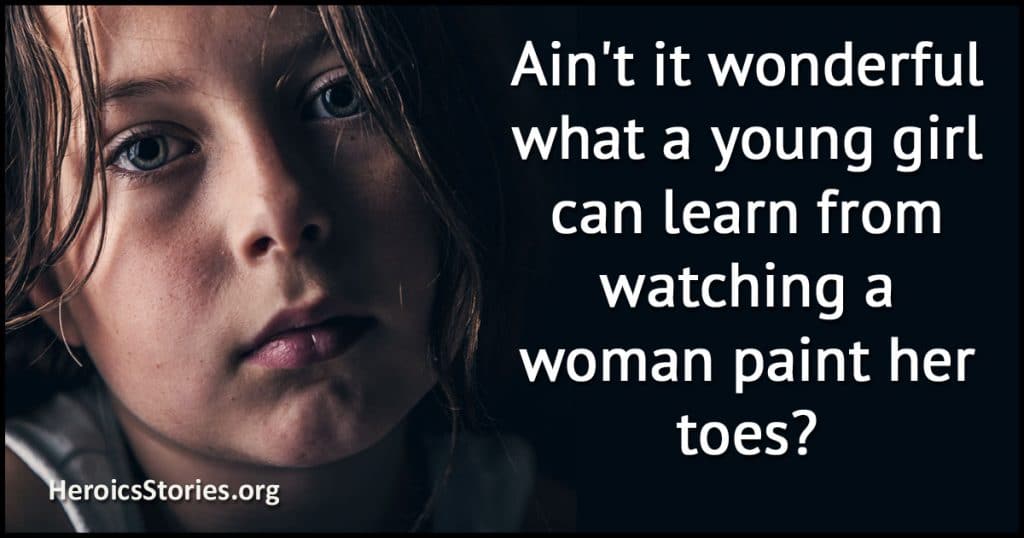by Casey Young
Sunnyvale, California, USA

Aunt Naoma rescued me from ignorance.
I was born in a small farm town in southern Illinois and spent most of my formative years where prejudices abound and being different was labeled as peculiar, eccentric, or some other charming pejorative that allowed a degree of acceptance. Unless, that is, it was about race. There was black and there was white and the definitions were set in folks’ minds as indelible.
During my fifth-grade year, my family had moved to a neighborhood gerrymandered to segregate the African-American community and the poor “white trash” into a school district. I usually didn’t make friends readily, but I had made friends this time.
My aunt, out on the lush spring grass of my grandma’s back yard, was painting her toenails in the bright afternoon sun. I plopped myself down and started yammering on authoritatively about various things, including the superiority of the white race and why anyone else was inferior — all thoughts I had heard from a variety of community sources. Aunt Naoma would utter an “uh-huh” or “Is that so?” intermittently as she spread her nail polish.
After my self-important speech, she calmly asked me, “Do you have any friends at school?” I named some people, wondering a only a trifle about the shift in topics. She asked what the first-named person was like and why she was my friend. I said something about how nice she was, and how much fun we had. Then onto the second person. Same questions, same answers. Then she asked me what color they were. Flustered, I noted that the named people where Negroes, but so what. She asked me why I walked to school, played, ate lunch and often chose to sit next to them in assembly if they were so inferior to me. I rose up in retreat and sputtered some sort of indignant answer that fooled no one, least of all me.
That conversation planted a whole acre of highly fertile seeds in my mind. I realized how contradictory my opinions were with my actions. Gradually, the realization of the dignity and value of my friends broke the logjam of jingoism I’d inherited from the community. I learned that day how to start thinking for myself, how to see past what was considered the norm. It jump-started my sense of “justice”.
The legacy my Aunt Naoma gave me that day while putting polish on her toenails and patiently listening to a bigoted child was one that grew into a very conscious choice to look beyond what others tell me is so simply because that’s the way it’s been or because of generalizations and stereotypes. What a magnificent gift. Because of it, I’ve not only had opportunity to work with all sorts of races and ethnicities and learn from those differences, but also to actively seek knowledge from those who have differences. After all, I am different, too. Ain’t it wonderful what a young girl can learn from watching a woman paint her toes?
Available in The Best of HeroicStories, Volume 2.
Podcast: Play in new window | Download (Duration: 4:58 — 3.9MB)


I am a Canadian-born, white skinned, blonde woman, thankfully raised by a mother who cared about others, no matter what colour they were. That experience was a blessing because I befriended a wonderful, very dark-skinned woman from Barbados. The son of my next-door neighbour was a retired Marine posted there and brought her home as a surprise for his parents. His mother, a French Canadian, came to me one evening to ask, “What shall I say when she gets here? She’s bringing 5 boys with her, and Eddy (her husband) is really prejudiced!” I simply said, “How about saying, WELCOME TO CANADA AILEEN?”
From that time on, Aileen was not only welcomed but showed us how special she was in caring for others. Eddy soon learned that. Aileen didn’t care what colour we were or what we did for a living, but proved that befriending others was not only easy but important to everyone, no matter our skin colour or where we came from. Her 5 sons learned about our country and were well trained by their mother. I will never forget her scolding me from time to time to pronounce her name with an “I”, not an “A”!
When Aileen passed away several years ago, to my surprise the funeral home was jammed with policemen, fire fighters, store owners, newspaper men and people who met and learned from this amazing coloured woman. It proved that colour doesn’t matter, but caring does. My memory of Aileen was how she scolded me from time to time to pronounce her name with an “I”, not an “A”!” My friendship with such an amazing woman with the BIG heart, no matter her colour, will always remind me to care for others too.